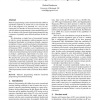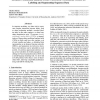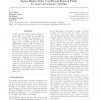250 search results - page 10 / 50 » Learning Complex Population-Coded Sequences |
132
click to vote
JAIR
2002
15 years 2 months ago
2002
We develop, analyze, and evaluate a novel, supervised, specific-to-general learner for a simple temporal logic and use the resulting algorithm to learn visual event definitions fr...
176
click to vote
AAIP
2009
15 years 3 months ago
2009
Inductive programming systems characteristically exhibit an exponential explosion in search time as one increases the size of the programs to be generated. As a way of overcoming ...
138
Voted
ICML
2004
IEEE
16 years 3 months ago
2004
IEEE
In sequence modeling, we often wish to represent complex interaction between labels, such as when performing multiple, cascaded labeling tasks on the same sequence, or when longra...
139
Voted
ICML
2009
IEEE
15 years 9 months ago
2009
IEEE
In real sequence labeling tasks, statistics of many higher order features are not sufficient due to the training data sparseness, very few of them are useful. We describe Sparse H...
122
click to vote
NAACL
2010
15 years 11 days ago
2010
Perceptron training is widely applied in the natural language processing community for learning complex structured models. Like all structured prediction learning frameworks, the ...



